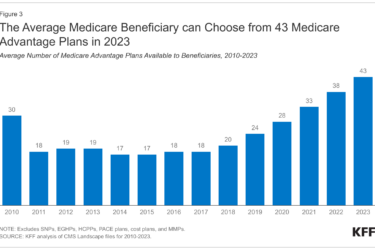Recently in this blog I suggested that reporters examine insurance companies’ record of controlling health care costs for older adults. And Mark Miller of Reuters decided to do just that.

Mark Miller
In a just-published column, Miller looked at Medicare Advantage – a private insurance option that covers hospital and doctor services – and Medicare Part D, a prescription drug program run entirely by insurance companies.
His conclusion:
“There’s already plenty of competition in Medicare and it has not resulted in lower costs, according to recent evidence. In addition, the competition hasn’t pushed seniors to shop effectively for low-cost options.”
Miller turned up important new research from George Washington University that sheds light on this topic. The key finding from that soon-to-be-published study:
“The annual per-enrollee cost for Medicare Advantage averages 3 percent more than traditional fee-for-service (FFS) Medicare in urban areas, and 6 percent more in rural areas.”
Another notable finding from the study is that seniors aren’t shopping for the best Medicare Advantage deals:
“Cost comparisons vary tremendously across the country. And in counties where Advantage plans are less expensive than FFS (fee-for-service), you’d expect a larger share of enrollees to pick them as cost-conscious consumers seek to drive down their health care costs.
But no such pattern exists. Instead, the data are all over the map – suggesting that seniors aren’t shopping the market to find lowest-cost plans.”
Would the same kind of pattern hold if older adults were given Medicare vouchers and had a greater financial stake in the outcome of their choices?
Republicans think not. The nature of competition in health care will change under a voucher-based system, providing stronger incentives to lower costs, they argue.
Others seem convinced that market-based competition just won’t work in health care and shouldn’t be the basis for major system-wide reforms.
Related
- Explaining the Medicare fight in a nutshell
- Quick links to cover Ryan’s view of health care spending
- Ryan selection brings Medicare, Medicaid proposals to forefront
 Judith Graham (@judith_graham), AHCJ’s topic leader on aging, is writing blog posts, editing tip sheets and articles and gathering resources to help our members cover the many issues around our aging society. If you have questions or suggestions for future resources on the topic, please send them to judith@healthjournalism.org.
Judith Graham (@judith_graham), AHCJ’s topic leader on aging, is writing blog posts, editing tip sheets and articles and gathering resources to help our members cover the many issues around our aging society. If you have questions or suggestions for future resources on the topic, please send them to judith@healthjournalism.org.









